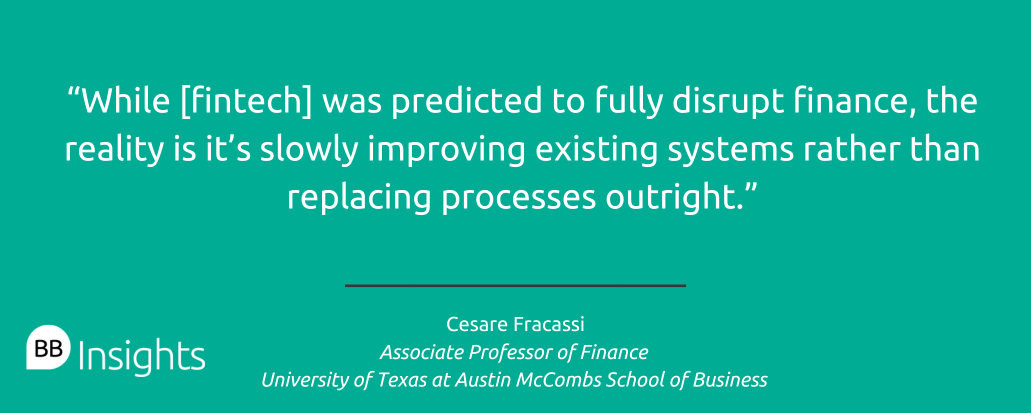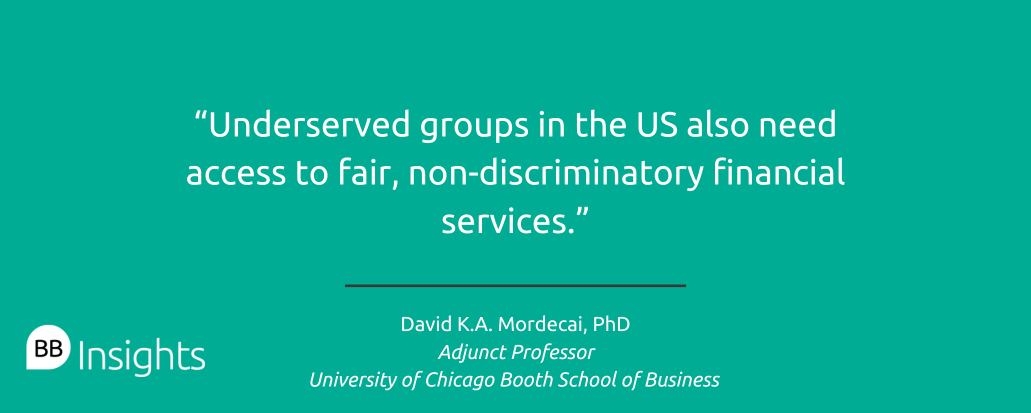Monzo, Revolut, Chase, Starling—it’s likely you have one of these cards stored in your (digital) wallet. All these fintech firms are ‘neobanks’, which operate online and without the need for physical branches.
It’s not just about fintech in banking, either. There are even trendy coffee shops making their way onto the high street in the US and the UK, such as venture capital (VC) backed chain, Blank Street.
We spoke to experts at top business schools to ask: what are fintech companies and what’s the future for fintech?
What are fintech companies?
Financial technology, or fintech, companies use modern technology to improve or enhance financial services. Fintech companies often reshape banking, payments, and investments with mobile apps, AI, and disruptive technologies.
Although the finance industry is no stranger to the use of technology, fintech began gaining mainstream traction in around 2015.
David K.A. Mordecai, PhD, is an adjunct professor at the University of Chicago Booth School of Business. He’s also president of New York-based advisory firm, Risk Economics Inc., co-managing member of technology enablement firm, Numerati Partners LLC, and scientist-in-residence of financial industry-led accelerator, FinTech Innovation Lab.
“Fintech refers to financial technology firms that are enabling more distributed, algorithmic, and action-oriented financial services through mobile devices. This allows some traditional bank functions to occur remotely,” he says.
Fintech adoption has been most visible in consumer payments and investment apps, with commercial/corporate fintech in trade finance becoming a developing area in the field.
Cryptocurrencies, which run on blockchain technology, are other examples of fintech systems.
Examples of fintech startups
Cesare Fracassi is an associate professor of finance at the University of Texas (UT) at Austin McCombs School of Business. He’s also director of the Blockchain Initiative at Texas McCombs.
“Fintech is where technology is used to lower financial frictions,” he explains.
“While [fintech] was predicted to fully disrupt finance, the reality is it’s slowly improving existing systems rather than replacing processes outright.”
Professor Mordecai from Chicago Booth also lists some challenges to fintech’s growth: “Distributed ledger technology such as blockchain has potential but still faces technical and adoption challenges at scale for legacy systems. The proliferation of computing through wearable devices and the Internet of Things (IoT) introduces promise and risks for financial institutions,” he says.
One example of a fintech innovation that has successfully disrupted the market, however, is the technology produced by unicorn startup, Stripe.
Founded in 2010, Stripe’s payment API—application programming interface—has revolutionized online payment systems by allowing payment providers to seamlessly connect with retailers’ websites or apps.
Before Stripe, clunky integration between payments and the internet existed, with users having to pay with third-party providers such as PayPal rather than making purchases directly with a bank card.
Now, most big companies integrate Stripe payments into their websites, with the fintech firm estimated to be worth a cool $65 billion.
The fintech industry is only going to expand as more disruptive technologies make their way into the finance market.
“The key technologies driving fintech growth are AI, machine learning, blockchain/smart contracts, central bank digital currencies, and payment APIs, especially for cross-border transactions,” says Cesare.
Fintech in banking: is this the end of physical banks?
Technology has opened the gates to fintech’s dominance in banking, with some fintech companies even outperforming physical banks on customer-facing aspects.
In the UK, Monzo and Starling rank first and second place respectively for customer satisfaction, with physical rivals such as HSBC and Royal Bank of Scotland lagging far behind, according to the Competition and Markets Authority survey.
So, if digital banks are seemingly outperforming brick-and-mortar banks, does this mean fintech in banking is set to eclipse physical banks?
“Digital banks such as Monzo and Revolut have made basic banking services like deposits and payments more convenient and cheaper, especially for younger generations. But large incumbent banks still dominate due to customer inertia,” explains Cesare from UT Austin McCombs.
In fact, 72% of individuals under 35 years old prefer using mobile app banking providers while only 24% of people over 55 prefer digital providers, according to a US-based study.
How does fintech make money?
In terms of how fintech makes money, you only need to look at all the successful fintech-driven companies and startups out there.
Broadly speaking, fintech firms generate revenue in areas such as subscriptions, advertising, fees, partnerships, investment, and data monetization.
NYC-born startup Blank Street Coffee implements a subscription program, which the CEO and co-founder Vinay Menda predicts that 30 to 40% of its customers will eventually subscribe to.
The coffee shop integrates technology to maximize efficiency, with fully automatic espresso machines that require fewer staff, which helps drive profits by keeping costs low. The chain also partners with local wholesale vendors to provide items at a competitive price point.
Its business model has clearly attracted investors as Blank Street Coffee has raised around $100 million since it launched in 2020.
The future of fintech: a remedy for financial inclusion?
The potential for fintech companies to improve financial inclusion is something that’s long been touted since fintech appeared on the scene.
“In emerging markets such as Africa and China, fintech has leapfrogged traditional banking, allowing mobile payments to take off rapidly. This is largely because these countries lack the legacy banking infrastructure present in developed nations,” says Cesare from UT Austin McCombs.
Fintech and digital banking in Nigeria, for instance, has boomed, with previously unbanked individuals starting to access digital financial services.
Between 2011 and 2018, fintech investments in Nigeria made more than $200 million, according to a PwC report.
Meanwhile in Mexico, 38% of adults do not own bank accounts but own a mobile phone, which presents great opportunities for financial inclusion via mobile apps. In 2023, almost 28 million adults with smartphones in Mexico accessed mobile banking.
One ongoing development in fintech is the use of cellphone credit as a way of processing payments and providing virtual money, which could provide a safer way for the unbanked to transfer funds and access financial services.
However, Professor Mordecai from Chicago Booth cautions against the assumption that fintech paves the way for financial inclusion and ensures equitable access in developing countries and emerging markets.
“Fintech's role in financial inclusion is debated,” he says. “Phone/telecom-based payment systems in developing countries show promise but have safety and security concerns.”
Financial inclusion isn’t just about providing access to financial services, explains Professor Mordecai, it’s also about ensuring safe, secure, and reliable financial transactions.
“Underserved groups in the US also need access to fair, non-discriminatory financial services.”
A critical problem that predominantly impacts disadvantaged groups is algorithmic bias. This happens when there are biases in the data, which can come from human input, how the AI system is trained, and how it's updated over time.
An example of algorithmic bias could be where a financial institution rejects loans from certain marginalized groups more than others, based on the data it’s been fed or learned.
“Ongoing attention to bias, privacy, security, and regulation is critical as fintech evolves,” adds Professor Mordecai.
Challenges of fintech
Regulators and business will need to work together to overcome the problems of integrating machine learning and artificial intelligence in business.
While fintech holds great potential to serve underserved markets, issues such as data bias are only the tip of the iceberg for the fast-moving industry.
Fintech firms also face major issues with cybersecurity, which Cesare from UT Austin McCombs predicts will be one of the biggest threats facing the sector.
Overall, he predicts that fintech companies will see steady linear growth, like we have seen over the last few years, rather than rapid exponential growth.
“While it’s exciting, the reality is that fintech is evolving financial services rather than abruptly displacing them,” he concludes.





